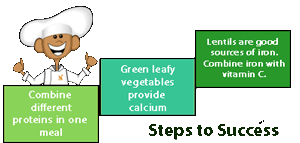
Teaching the basics of vegetarianism is one of the most important steps a teacher can take to help children understand vegetarian eating habits.
People choose to become vegetarians for a variety of reasons including religion, concern about animal rights, as well as family and peer pressure; but the majority is making the change for the numerous health benefits associated with a meat-free diet.
A well-planned vegetarian diet is extremely healthy and provides all the important vitamins, minerals, proteins, carbohydrates and essential fatty acids. According to recent studies, a well-balanced vegetarian diet can reduce a risk of several chronic conditions such as obesity, heart disease, hypertension, diabetes, and some types of cancer.
There are several different types of vegetarian diets:
-
Vegans
-
Lacto Vegetarians
-
Lacto Ovo Vegetarians
-
Semi-Vegetarians
-
Raw Vegetarian
-
Fruitarians
According to The American Dietetic Association, a well-planned vegetarian and vegan diets can fulfill all nitrogen needs and essential amino acid requirements for kids’ growth and development. Children’s diet must include enough calories to support growth and have reliable sources of important nutrients including: protein, iron, zinc, vitamin D, and vitamin B12.
Protein has many important functions in the body and is essential for growth, development, and maintenance. Protein needs can easily be met by eating a variety of plant-based foods. Rich sources of protein for vegetarians and vegans include beans, nuts, peanut or almond butters, peas, and soy products (tofu, tempeh, veggie burgers). Milk products and eggs are also good protein sources for lacto-ovo vegetarians.
Iron functions primarily as a carrier of oxygen in the blood. Iron sources for vegetarians and vegans include iron-fortified breakfast cereals, spinach, beans, peas, lentils, turnip greens, molasses, whole wheat breads, and some dried fruits such as dried apricots, prunes, and raisins.
Calcium is essential for building bones and teeth and in maintaining bone strength. Sources of calcium for vegetarians and vegans include calcium-fortified soymilk, calcium-fortified breakfast cereals and orange juice, tofu made with calcium sulfate, and some dark-green leafy vegetables such as collard greens, turnip greens, bok choy, and mustard greens. Also, milk products are excellent calcium sources for lacto vegetarians.
Zinc is necessary for many biochemical reactions and also helps the immune system function properly. Sources of zinc for vegetarians and vegans include many types of beans , zinc-fortified breakfast cereals, wheat germ, and pumpkin seeds. Milk products are considered a good zinc source for lacto vegetarians.
Vitamin B12 is needed to produce healthy red blood cells, which carry oxygen throughout the body. Vitamin B12 is also important in supporting neurological functions and in production of DNA- the protein that carries the genetic material within the cells in the body. Vitamin B12 is found in animal products and some fortified foods. Sources of vitamin B12 for vegetarians include milk products, eggs, and foods that have been fortified with vitamin B12. These include breakfast cereals, soymilk, veggie burgers, and nutritional yeast.
Learn about the different of Vegetarians and vitamin B12
It is very important to know that being a vegetarian comes with many challenges and difficulties at school-it requires  determination and discipline, as well as making sacrifices.
determination and discipline, as well as making sacrifices.
These are some of the challenges a young vegetarian may face at school:
-
Young vegetarians may have to cope with other student’s mindsets, comments, and even ridiculing, for their food choices.
-
They may experience difficulty in finding healthy vegetarian meals and snacks at school.
-
Kids may be tempted to eat unhealthy vegetarian foods – such as fried foods, sugary snacks, ice cream, etc.
Here are some helpful hints to overcome some of the challenges of being a vegetarian at school:
-
Try school lunches. Some schools have vegetarian hot lunches. If not, consider buying a cold lunch or bringing lunch to school.
-
Pack your own lunch and let your friends try some of your food. Your friends may like the taste of the vegetarian food!
-
Eat a healthy diet. Your friends may be encouraged to try a vegetarian diet when they see you eat a healthy meal and know a lot about nutrition.
-
Try vegetarian food pyramid to get ideas on what to eat. It is important for vegetarians to consume wide variety of different foods to prevent nutrition deficiencies.
Healthy Eating

Healthy Child

Written by Maryam Malekian
•
Written on Feb 26, 2013
•
Last updated on Oct 16, 2013

 determination and discipline, as well as making sacrifices.
determination and discipline, as well as making sacrifices. 
0 Comments